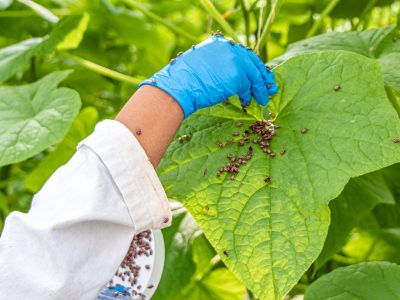AMADO, ARIZ., June 28, 2022 – Wholesum, leading growers and shippers of Fair Trade Certified, 100% organic farm-fresh vegetables, published its annual Conscientious Company Report today. The report highlights the company’s commitments and achievements in social and environmental responsibility for 2021 using the company values of Integrity, Responsible Growing, People on the Move and Problem Solving as the framework to guide these efforts.
“Sustainability is a journey and evolution,” states Ricardo Crisantes, Chief Commercial Officer of Wholesum. “Each year, we are faced with new challenges, but also find innovative ways to address the needs of our stakeholder community in a holistic manner.”
The report details advances in renewable energy use, ecosystem management, fair trade impact and other areas where the farms execute responsibility. The report also highlights the company’s progress towards the UN Sustainable Development Goals. Wholesum officially joined the UN Global Compact in 2018 and is working to advance SDGs 5 and 12, Gender Equality and Responsible Consumption and Production.
These are the highlights of the report:
Organic Integrity:
- 35,476 tons of 100% organic produce were taken to market in 2021.
- For pest management, Wholesum produced 798,000 lady bugs in-house for use on cucumber crops and spent 170,000 labor hours on manual pest removal as an alternative to pesticide use.
- 12 acres of new high-tech, energy and water efficient tomato greenhouses were built at Wholesum Farms Sonora for increased organic tomato production.
Responsible Agriculture:
- Wholesum captured and recirculated 18% of irrigation water at Wholesum Farms Arizona equaling to 16 million gallons. This decrease in water efficiency from last year was due to increased phytosanitary measures and the transition to an improved water recirculation system that will be fully operational this year.
- Wholesum achieved 60% renewable energy use across the three family farms, increasing energy efficiency across the family farms by 16% from the prior year.
- Through its partnership with Tampico Energy SAPI de CV the company achieved 100% renewable energy at Wholesum Farms Sonora.
- To support biodiversity, the company planted 490 native trees and flowers that support the native fauna in the surrounding farming communities.
- 818 employees received sustainability training on topics such as responsible water use.
People on the Move:
- 62% of Wholesum’s produce was sold under Fair Trade terms, earning additional funds for the farmworker communities.
- $1.8 million in fair trade premiums were paid out to Wholesum’s producers to invest in projects that address worker and community needs. This is a 42% increase from last years’ premiums summing to over $7.7 million in Community Development Funds since the inception of the fairtrade program
- In 2021, the fairtrade committee at Wholesum Farms Sonora implemented an educational recovery program that helped 65 students get back on track with their education after a challenging pandemic year.
Problem Solvers
- Wholesum continued its commitment to SDGs 5 and 12, measuring gender data in the company and classifying inputs as renewable or non-renewable to identify areas of opportunity for improvement.
- Wholesum reports a 44% female employee population and has identified opportunities to develop women within the company to managerial positions.
- Due to new constructions at Wholesum Farms Sonora and the 10,000 square foot expansion of the Wholesum warehouse, Wholesum saw an increase in the use of non-renewable inputs in 2021.
“We are meeting complex environmental and social challenges with an innovative spirit,” states Crisantes. “In 2021, we expanded our operations in Sonora and our warehouse in Nogales in response to increasing demand for high quality fresh organic produce. At the same time, we were able to reach 100% renewable energy in Sonora and installed energy efficient solar panels at our warehouse to displace electrical energy use. Through our efforts we can accomplish our mission to beat conventional through responsible practices for the wellbeing of our community.”
